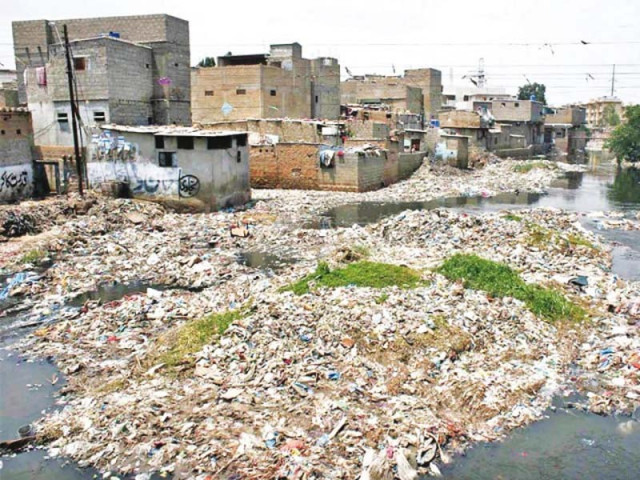Karachi water board’s failure can lead to an epidemic, SC fears
Apex court releases nine-page order listing ways in which KWSB has failed

Untreated waste going directly into the sea has made the beach unfit as a space for recreation. PHOTO: FILE
The apex court has personally summoned the heads of the Sindh Environmental Protection Agency (Sepa), the provincial health secretary, the managing directors of SITE and the Korangi Industrial Estate and the head of the pollution control department at Karachi Port Trust on March 13 over the discharge of untreated domestic and industrial waste directly into the sea.
These observations and directions were contained in a nine-page order released by the apex court after a three-member bench conducted lengthy proceedings in a case relating to the government’s failure to supply clean drinking water, deteriorating sanitation conditions and its impact on the environment in Sindh.
SC orders removal of KWSB managing director, secretaries
The bench, comprised justices Amir Hani Muslim, Qazi Faiz Isa and Faisal Arab, held proceedings at SC’s Karachi Registry and will resume the case on March 13.
Not doing its job
A board to supply water and dispose of sewerage in Karachi was established under the Karachi Water and Sewerage Board Act, 1996, “to ensure that the water supplied by it is duly filtered, treated and tested and is fit for human consumption”. This is mentioned specifically in sub-section 2 of section 5 of the act.
The utility is also required to construct, maintain and operate, sewerage works to collect, pump, treat and dispose sewerage and industrial waste.
“But as reported, and not disputed by KWSB, it has failed to fulfil its primary statutory mandate; un-filtered, untreated and un-tested water is being supplied and the entire sewerage of Karachi, one of the largest metropolises in the world, is dumped untreated into Arabian Sea,” observed the judges.
The judges were informed that KWSB has around 13,000 employees but is still not able to fulfil its basic statutory duties and, despite the large number of employees, the appalling malfunctioning continues unabated.
Form committee to resolve water scarcity, sanitation issues, SC tells Sindh govt
They noted that the minutes of the last meeting of the board show that the demands of the Combined Bargaining Agent (CBA) of the KWSB are being met while disregarding KWSB’s statutory mandate.
“The poor taxpayers and citizens of Karachi have paid heavily for setting up water filtration plants and sewerage treatment plants but, regretfully, the water filtration plants are not properly functioning and the sewerage plants lie derelict.”
The bench observed: “In failing to perform its statutory duty KWSB has exposed the residents as well as all visitors to the city to avoidable water-borne diseases. It is estimated that four-fifths of all illnesses are caused by waterborne disease, many of which result in fatalities. As a consequence of the callous disregard by KWSB of its duty, government hospitals are over-burdened by those suffering from water-borne diseases and many citizens who avail of private treatment also have to incur avoidable expense.”
No fun at the beach
The bench observed that the citizens of Karachi are punished even more when raw sewerage is dumped into the Arabian Sea which contaminates the beach and the coast, yet another health hazard.
“The people are also deprived of the enjoyment of the city’s beaches for health and recreation. There is no monitoring of the beach water quality, however, as raw sewerage is released into the sea the dangers of swimming or wading in such water are manifold,” noted the bench. “The beaches are also littered with dangerous waste, which the tides deposit on the beach such as discarded injection needless.”
The judges noted that though KWSB cannot provide basic services yet it continues to expand its network by granting approvals to new housing schemes in a purely mechanical manner and by ex-post facto approvals.
Unfit for human consumption: SC forms commission to investigate drinking water in Sindh
“KWSB appears oblivious to the fundamental rights of citizens, including the right to have uncontaminated water to drink which can be considered the bedrock to the right to life (Article 9 of the Constitution). The rivers and other water channels in Karachi have also been rendered open sewers by raw effluents. If not rectified immediately this state of affairs may lead to an epidemic of infectious diseases.”
The judges noted that the SC-appointed judicial commission’s report had also shown concern about the medical waste and the industrial waste generated by the hospitals and industries situated in Karachi.
Therefore, it summoned the heads of Sepa, the provincial health secretary, SITE and Korangi Industrial Estate MDs and the head of the KPT’s Pollution control department on March 13.



















COMMENTS
Comments are moderated and generally will be posted if they are on-topic and not abusive.
For more information, please see our Comments FAQ